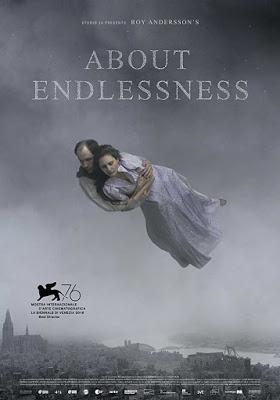
About Endlessness won the 2019 Best Director award at the Venice film festival and the European film award for the best visual effects supervisor. It is a film that offers value for a contemplative viewer rather than a casual one. It is not a film likely to be on the best film lists of most film reviewers. All his films are based on his own original screenplays, with a distinct style of his own.
Andersson’s films offer what a Scorsese or a Tarantino film almost never offers. He creates scenes often using a building structure to underscore ideas. In a typical Andersson film, you will have characters outside a building looking at people inside it and vice versa. His films have individuals who deliver monologues at the camera (the viewer), while others, bar a few, in earshot seem to ignore the spoken words as though they are in a tableaux. These are obvious touches of the theater of the absurd. Sometimes in Andersson’s films buildings seem to move as a moving train would!
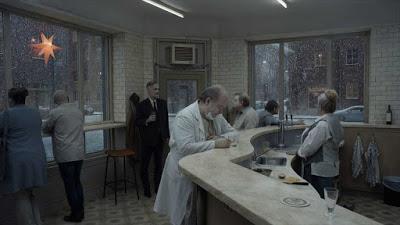
A man exclaims "It is fantastic!" when most others don't react.
In the foreground, is a dentist,(still wearing his medical overcoat)
who can't treat his patient scared of needles.
In a bar, where all customers are nursing their drinks silently, one customer exclaims “It is fantastic!” No one responds. Then the bartender asks, “What is?”The customer looks at the snowfall outside the bar and exclaims, “Everything!” None of the other customers nursing their drinks silently with no evident sign of happiness seem to be lifted up by the snowfall outside. The elements and moods outside and inside a building are often contrasted in an Andersson film, which makes him different and yet interesting. He seems to love provoking the mind of a lazy, laidback film viewer.
In a brilliant sequence, a well-mannered waiter in restaurant patiently waits at a table occupied by a single gentleman who seems engrossed reading a newspaper. He is aware of the patient waiter who is waiting silently to serve his wine after he has approved it. When the gentleman finally takes his eyes off the newspaper and does approve of the wine, the waiter dutifully pours the wine but does not stop pouring it even after the glass is full and the wine spills on the spotless white tablecloth much to the surprise of the gentleman (and of the viewer). The sadness, the irony, and the inner viewpoints and the unusual behaviour of the two individuals are in stark contrast with the world’s happiest populations that reside in Scandinavia, of which Sweden is a nation that comprise it.
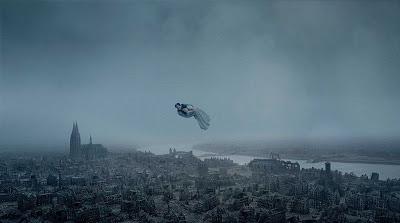
A surrealistic scene from the film...
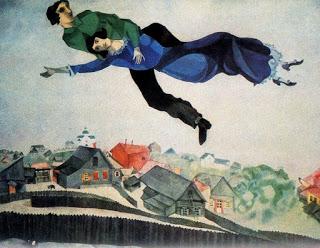
..the connection to Marc Chagall's famous painting
"Over the town"
Andersson’s visuals have references within and without the film that can escape a casual viewer. In About Endlessness, there is the poster sequence of a man and woman flying (like an anti-hero version of Superman without a cape holding his lover) over a bombed city (Dresden? Cologne?). Only art enthusiasts will pick up the connection of the visual with Marc Chagall’s famous painting “Over the town.” Are the flying man and woman, characters from the film About Endlessness? Perhaps they are. Is the reference to bombed city connected to the vignette in About Endlessness showing Hitler in his last days in the bunker with his chosen Nazi army commanders barely in a state to acknowledge him with the mandatory “Hail Hitler/Sieg Heil”? Perhaps it is. Perhaps it is also connected to the visuals of a defeated column of soldiers marching dejectedly towards their prison camp.
One of the fascinating facets of Andersson’s script is that each individual in his films might appear unconnected to the rest of the characters. Yet they are connected (appearing in later sequences with identifiable clothes) and it is for the alert viewer to connect the dots and figure out Andersson’s cinematic crossword puzzle.

A woman, who loves champagne, seems
less interested in her lover than her drink
In About Endlessness, director/scriptwriter Andersson introduces a new element to his unique brand of cinema—a chorus-like invisible female narrator who keeps saying “I saw a man..,” “I saw a woman..,” “I saw a young man...” etc. to demarcate different characters/segments in the film The variety of subjects relating to love in any Andersson film is staggering. There are lovers, young and old.A woman loves champagne more than her male lover doting over her. A young woman tries to attract a young man “who had not found love.” A father kills his daughter because she has brought dishonour to his family. A set of parents with flowers seek out their progeny’s grave.
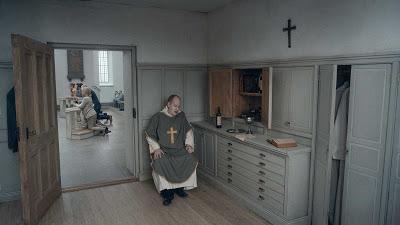
A priest who has lost his faith contemplates his predicament,
as his congregation waits for the Holy Communion

A man carries his allegorical cross (as Jesus did) in modern Sweden.
There are quaint, surreal situations in Andersson’s cinema. A prominent one in About Endlessness is of a priest who has lost his faith in his religion and seeks psychiatric help. But he refrains from quitting his vocation stating “...but it is my livelihood!” Much of Andersson’s films deal with financial stress. What does such a priest do? He gets drunk imbibing the wine he is supposed to serve to his religious flock as blessed wine in Holy Communion! Later in the film, the priest is shown carrying his wooden cross against his will re-enacting Jesus Christ path to crucifixion in modern Sweden, while some watch emotionless.
A grown-up man complains that his childhood classmate refuses to acknowledge him on the street. Has one man moved on in life with social contentment while the other has not and bogged down in pleasant age-old memories? An old couple stare at their Swedish city from a high point and comment about September, possibly the best part of the year.
The final sequence in each Andersson film is carefully chosen to reinforce the central idea of the entire film. In About Endlessness, a man drives his car that suddenly breaks down in the middle of nowhere. It does capture the human being’s lack of control on what happens to them and the quixotic attempts to salvage the situation. And the viewer gets to look at the man’s predicament from the sky (recall the final shot of Arthur Penn’s Night Moves).
P.S. About Endlessness is definitely a film that makes you think and a remarkable film of 2019 and deserving of the Venice Film Festival award bestowed on it. A very useful and informative video essay on Andersson's five films made before About Endlessness follows the trailer.

